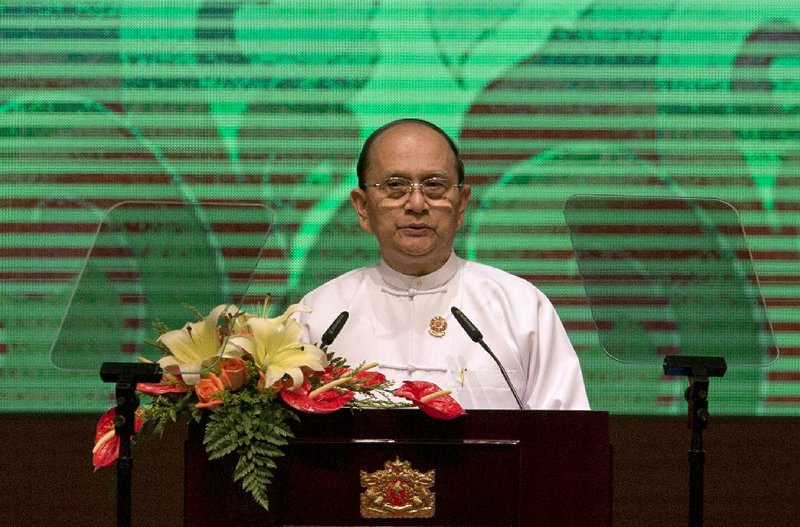NAYPYIDAW, Burma -- Vietnam and the Philippines pushed for stronger action to confront China's aggressive behavior in the South China Sea at a Southeast Asian summit Sunday that was hosted for the first time by Burma, a former pariah state now eager to show off its fragile democratic reforms.
A showdown between Chinese and Vietnamese ships near the Paracel Islands has put a spotlight on long-standing and bitter maritime disputes. The stakes are high, with Beijing claiming sovereignty over much of the strategically important waters -- among the world's busiest transport lanes and believed to contain significant oil and gas reserves.
Several members of the Association of Southeast Asian Nations reject China's claims, saying parts of the sea are theirs. But few are willing to risk their economic and political ties with the regional powerhouse.
A statement released by Southeast Asian leaders at the close of Sunday's meeting expressed concern and called for restraint by all parties involved in the maritime disputes, but made no direct mention of China.
Vietnam and the Philippines made it clear from the start that they wanted more.
"China has brazenly moved its deep-water drilling rig escorted by over 80 armed and military vessels and many airplanes to the Vietnamese waters," Vietnamese Prime Minister Nguyen Tan Dzung was quoted as saying. The vessels "fired high-powered water cannons and rammed straight into the Vietnamese public-service and civil ships, causing damage to many ships and injuring many people on board."
The standoff between China and Vietnam started May 1, when China moved a deep sea oil rig into waters close to the Paracel Islands. Vietnam, which says the islands belong to it, immediately dispatched ships.
China insists it is doing nothing wrong and said Thursday that it had "maintained a lot of restraint" in the face of "intensive provocations" by Vietnam that were endangering its personnel and property.
Vietnam says the security and free navigation of the strategic waterway are now under serious threat.
Vietnam allowed several hundred demonstrators to stage a noisy rally outside the Chinese Embassy in Hanoi on Sunday against Beijing's deployment of the oil rig.
The country's authoritarian leaders keep a very tight grip on public gatherings for fear they could attract anti-government protesters.
Other protests, including one drawing more than 1,000 people in Ho Chi Minh City, took place in other locations around the country. For the first time, they were reported on enthusiastically by the state media.
The government has in the past forcibly broken up anti-China protests and arrested their leaders, many of whom are also campaigning for greater political freedoms and human rights.
The United States has criticized China's latest action as provocative and unhelpful.
Chinese Foreign Ministry spokesman Hua Chunying responded by saying that the issue should not concern ASEAN and that Beijing was opposed to "one or two countries' attempts to use the South Sea issue to harm the overall friendship and cooperation between China and ASEAN," according to China's state-run Xinhua News Agency.
Philippine President Benigno Aquino III, meanwhile, said he intended to raise his country's own territorial dispute with Beijing at the summit, while calling for support to resolve the conflict through international arbitration.
ASEAN leaders also discussed tensions on the Korean Peninsula, reiterating their commitment to a region "free of nuclear weapons and all other weapons of mass destruction," according to a draft of the final statement.
They also discussed the need to effectively tackle threats such as cybercrime, human trafficking and climate change, as well as food and energy security, human rights issues and efforts to create an ASEAN economic community.
It was the first time Burma hosted a summit of Southeast Asian leaders since it joined the 10-member bloc in 1997.
The country was previously passed over because of its poor human rights record. Though much work needs to be done, Burma has implemented sweeping political and economic reforms since ruling generals handed over power to a quasi-civilian government in 2011 following a half-century of military rule.
Burma is often called Myanmar, a name that ruling military authorities adopted in 1989. Opposition leader Aung San Suu Kyi and other regime opponents have refused to adopt the name change, as have the U.S. and Britain.
ASEAN comprises Brunei, Burma, Cambodia, Indonesia, Laos, Malaysia, the Philippines, Singapore, Thailand and Vietnam.
Information for this article was contributed by Oliver Teves and Chris Brummitt of The Associated Press.
A Section on 05/12/2014

